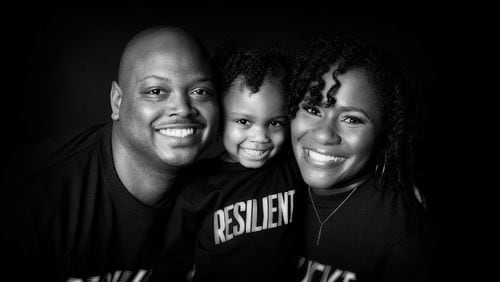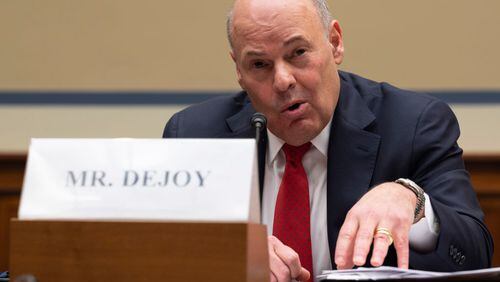Last summer, as she posted a video to her Instagram account, Sanari Hendricks was flooded with emotion.
She watched herself describe the near-death experience delivering her son, Zeus, in 2019.
“I am grateful to be here. I am grateful to be the mother of two beautiful and happy babies and healthy babies,” she said in the video.
But at that moment, this was no longer her truth.
Hendricks had filmed the video in October 2019 as part of the Centers for Disease Control and Prevention’s Hear Her campaign to prevent pregnancy-related deaths. By the time it was released after pandemic-related delays, her 13-month-old son, Zeus, had died.
More than 80% of Americans will spend Mother’s Day celebrating the women in their lives, but for some of them, it can be a reminder of a traumatic journey they never imagined they would take.
In the weeks leading up to Mother’s Day when my inbox was inundated with emails advertising gifts for the holiday, I noticed one retailer offered an opt-out option acknowledging that Mother’s Day could be a difficult day for some. “We’re here for you,” said the text above the button that would stop the emails. It was a signal to me that at least in some spaces, women’s voices are being heard.
More than 50,000 women in the country experience life-threatening complications each year during pregnancy, according to data from the March of Dimes. And in 2019, the CDC reported Georgia’s infant mortality rate at 7%.
Georgia consistently ranks alarmingly low as compared to other states in terms of maternal and infant health outcomes, said Kyesha Lindberg, executive director of Healthy Mothers, Healthy Babies Georgia, an organization that works to improve access to prenatal and preventive health care for women, children and families.
Some populations are disproportionately impacted, including women in rural areas with limited access to health care, women who live in poverty or women of color who may face unconscious bias from health providers. But the reality is all women could find themselves at risk.
Emphasis should be placed on building better systems and better trust, Lindberg said. “We don’t want to lay blame on any one entity. We need not focus on any one system but identify the way each system can play a part in more equitable health outcomes for Georgia’s moms and babies,” she said. “We need to own the voice we have been given on both ends so it is a conversation, not a dictation when it comes to care for families.”
Hendricks and her husband, Simeon, a firefighter and EMT, were already the proud parents of Zion, their now-3-year-old daughter, when Hendricks gave birth to Zeus on May 21, 2019. After 48 hours of natural labor, Hendricks had an emergency C-section and Zeus was whisked off to the NICU, where he was treated for an infection.
Meanwhile, Hendricks was in pain, but health workers told her it was gas. For days, she was given a range of medications from opioids to laxatives, but when those failed to work, she went to the ER, where she was told she had a UTI. Still in pain, Hendricks went to a different hospital, where doctors found an 11-centimeter abscess on her uterus. She spent five days in the hospital for treatment.
For the first 20 days of her son’s life, they spent 13 days apart, she said.
She thought that was their story and she was grateful that it ended with both her and her son in good health. She volunteered for a case study, which led to filming the CDC video. She posted family photos on Instagram of her brood — she and her husband laughing with their two children.
Then one morning in June, her son didn’t wake up at his usual time. He was lethargic and vomiting. She took him to see a doctor, who thought he might have roseola and dehydration. The doctor told her to stop at the emergency room before going home.
At the hospital, health workers said they would give him fluids and complete bloodwork. As she waited, Hendricks thought Zeus’ heart rate was dropping. She felt he was struggling to breathe. They kept adjusting the monitor on his foot. “They weren’t looking at him; they were looking at the monitor,” Hendricks said.
About two hours after they had arrived, a nurse came in and placed her hands on Zeus’ skin before grabbing him and running from the room, Hendricks said. In the blur that followed, she remembered him being given eight rounds of EPI and CPR for 50 minutes. Then she was holding her son in her arms, praying to God for a different outcome.
“We are still trying to seek answers,” said Hendricks, who feels the same challenges that resulted in her traumatic birth experience also contributed to her son’s death. “At the end of the day, I feel they treated me like an overbearing mother. I want to see our voices heard.”
In April, she posted another video. Since Zeus’ death from an acute heart inflammation, she had been posting the good things — the people, the experiences, the moments that gave her strength — but this time she decided to offer a different perspective.
“I wanted to let people know, especially the people who could be dealing with this as well, that I do struggle. I want people to really understand,” she said. She wasn’t ready to hear platitudes like everything happens for a reason. She still can’t believe God had a reason for taking her son.
Credit: Shane Michael Photography | Mike Newman
Credit: Shane Michael Photography | Mike Newman
“It is toxic for people to try to make you see how good God is right now,” she said. “That is not where I am.”
After sharing that video, she heard from so many other women who had lost children and felt as if they couldn’t talk about their grief or couldn’t share feelings of how they blamed themselves.
“What has gotten me through is finding other mothers who have been there,” Hendricks said.
She wants women to feel that their voices are being heard. She wants doctors to view every patient as an individual. And she wants everyone to understand that this could happen to anyone.
“This isn’t just a poor people’s problem. It isn’t just a Black, white or brown issue. This is a Georgia issue. We need to do better,” Lindberg said.
Hendricks and her family have continued with grief counseling but sometimes she stumbles. When people ask how many children she has, Hendricks is never sure how to respond. “Lately, I just tell it all and we talk about it because I am not ready to say I am a mom of one,” she said.
But soon, she will have to revise that answer.
On April 27, Hendricks and her husband shared with family that they are expecting another child.
It is tough facing Mother’s Day with a mixture of fear and sadness, Hendricks said, but she knows children are a blessing and she is holding on to gratitude.
Read more on the Real Life blog (www.ajc.com/opinion/real-life-blog/) and find Nedra on Facebook (www.facebook.com/AJCRealLifeColumn) and Twitter (@nrhoneajc) or email her at nedra.rhone@ajc.com
About the Author








